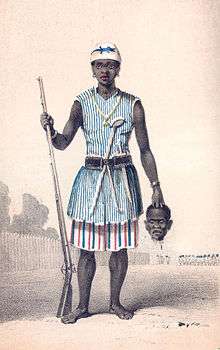Seh-Dong-Hong-Beh

Seh-Dong-Hong-Beh (meaning, "God Speaks true") was a leader of the Dahomey Amazons. In 1851, she led an all-female army consisting of 6,000 warriors against the Egba fortress of Abeokuta, to obtain slaves from the Egba people for the Dahomey slave trade.[1]
Her age and date of death is unknown. She could have been in her late teens, 20s or early 30s when mentioned in 1850, since she was a leader of the Dahomey Amazons and was pictured in her physical prime. Dahomey Amazones could be enlisted even as small girls already at age 8 or 10, however they could be killed at an early age in any battle they would be fighting. An inconclusive guess would be that she could have been born sometime between 1815 and 1835, if assuming she was aged between late teens and early 30s in 1850. She was not mentioned by the French army during the Dahomey-French wars, so she might have died in battle or retired any time between 1851, 1874, the year of first skirmishes with the French army or by 1889, the year of the First Franco-Dahomean War.
She was portrayed with name and a hand drawn, partially colored portrait in her uniform, armed with a musket and holding a captives decapitated head, in the 1851 book "Dahomey and the Dahomans"[2] by Frederick Edwyn Forbes, a British Navy Commander and member of the Royal Geographical Society. As a deeply convinced abolitionist, he traveled to the Dahomey kingdom in 1849–50 with the mission of convincing king Guezo to stop the African slave trade. He described her female Dahomey army in detail, commenting on their lifestyle and behaviour as inserts in his negative descriptions and observations of the Dahomey wars for slave trade.
F. E. Forbes was not the only naval officer trying to end slave trade in West Africa and mentioning her Dahomey female army.
As quoted from the book about her king commander and formal husband, Dahomey king Guozo, in the years 1850–1852:
In order to bring an end to slave dealing the British Navy went in search of the final traders and offered them large sums of money in exchange for firm promises to give up their lucrative business. Guezo, King of Dahomey had an army of 3000 women, to each of which he was married, having sold all the menfolk as slaves. For entertainment he indulged in the sacrifice of trespassers from neighbouring West African countries. He welcomed the approach of the naval officers, declaring Victoria and Albert as his closest friends.[3]
References
- ↑ "African Women Warriors". Retrieved 10 September 2006.
- ↑ Frederick Edwyn Forbes. "Dahomey and the Dahomans, Being the Journals of Two Missions to the King of Dahomey, and Residence at His Capital, in the Year 1849 and 1850, Volume 1". Longman, Brown, Green,and Longmans.
- ↑ Tim Coates. "King Guezo of Dahomey, 1850–52: The Abolition of the Slave Trade on the West Coast of Africa". Stationery Office. ISBN 9780117024601.